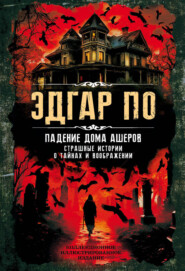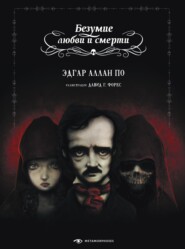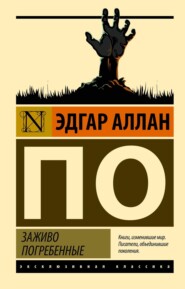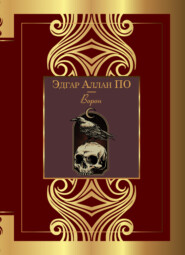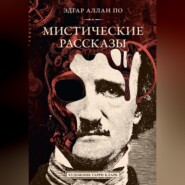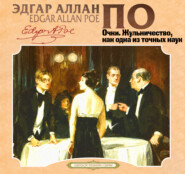По всем вопросам обращайтесь на: info@litportal.ru
(©) 2003-2024.
✖
Золотой жук. Уровень 1 / The Gold-bug
Настройки чтения
Размер шрифта
Высота строк
Поля
Золотой жук. Уровень 1 / The Gold-bug
Edgar Allan Poe
Легко читаем по-английски
Английский сводит вас с ума? Сходите с ума вместе с героями Эдгара Аллана По! Безумцы и гениальные детективы, аристократы и морские путешественники ждут, пока вы присоединитесь к их мистическим приключениям.
В книгу вошли лучшие рассказы из различных сборников Эдгара Аллана По. Мастер психологической прозы, один из родоначальников жанров мистики, хоррора и детектива, – это тот автор, знакомство с которым вы не хотите упустить. Его рассказы полны напряжения, подобно лучшим фильма Хичкока. Ими вдохновлялись А. Конан Дойль, Г. Ф. Лавкрафт, В. Брюсов и К. Бальмонт. Даже критически настроенный В. Набоков, отвечая на вопрос «Кто из американских писателей ему нравится больше всего?», назвал Эдгара Аллана По.
Текст адаптирован для начинающих изучение английского языка (уровень 1 – Beginner (A1-А2)). Книга содержит словарь, подробные комментарии и упражнения для проверки понимания прочитанного. Сложный и витиеватый стиль По стал гораздо доступнее, благодаря адаптации, которую подготовила замечательный лингвист и опытный автор учебных пособий Александра Игоревна Смирнова.
Эдгар Аллан По
Золотой жук. Уровень 1 / The Gold-bug
© Смирнова А. И., адаптация, упражнения, словарь, 2023
© ООО «Издательство АСТ», 2023
Edgar Allan Poe
The Gold-Bug
The murders in the rue Morgue
I met Dupin in France in the summer of 18-. His family was once rich and famous. Now, due to some unfortunate events, he was poor. He had so little money he only could buy the most necessary things. But it bothered him little as well. He could afford a few books – fortunately, these were easy to buy in Paris – and that was enough for him to be happy.
We first met each other at an obscure library in the Rue Montmartre. We were searching for the same very rare and remarkable book. We saw each other again and again. Soon we began to talk. He told me the history of his family which I found very interesting. I was also surprised how well-read he was. I felt that the society of such a man would be to me a treasure beyond price. Eventually we decided to live together while I’m in the city as it was beneficial to both of us.
We never had visitors and spent our time reading, writing or talking. One could call us madmen because of our hermit lifestyle. But we enjoyed our loneliness. When it was nighttime, we used to go for a walk, arm in arm, continuing the topics of the day. So were the days.
I soon noticed his ability to look through one’s soul. He surprised me by telling what he knew about my own soul. He knew things about me that only I could knew. At these moments of insight, he was cold and distant; his voice became high and nervous. At such times, I thought of him as a double Dupin – the creative and the resolvent.
One night we were strolling down one of the long dirty streets of Paris. Both of us were silent, each thinking our own thoughts. Suddenly Dupin broke the silence:
“He is a very little fellow, that’s true, and would do better for less serious acting.”
“Absolutely, no doubts about that!” I answered unwittingly.
For a few seconds I continued walking, and thinking; but suddenly I realized that Dupin agreed with something which was only a thought.
“Dupin,” I said, “this is beyond my understanding. How could you know that I was thinking of…”
“How did I know you were thinking of Chantilly? You were thinking that Chantilly is too small for the plays in which he acts.”
These were exactly my thoughts.
“Tell me, for Heaven’s sake,” I exclaimed, “the method-if method there is-by which you are able to look through my soul in this matter.”
“It was the fruit-seller.”
“Fruit-seller!? I know no fruit-seller.”
“He ran up against you as we entered the street – it was fifteen minutes ago.”
I now remembered that. A fruit-seller was carrying a large basket of apples; he almost threw me down. But I still didn’t understand what it had to do with Chantilly.
“I will explain,” he said, “listen to me carefully.”
“First, the fruit-seller ran into you. You stepped into one of the loose fragments of the pavement. The uneven stones hurt your ankle and you muttered a few words; then you proceeded in silence. You kept looking at the stones, and, when we entered the little alley Lamartine, you noticed it was paved with the overlapping and riveted blocks. I read your lips saying ‘stereotomy’. I knew you couldn’t say that without thinking of Epicurus. Not long ago you and I were talking about his ideas about the earth and the stars and the sky. You then looked up in the sky which confirmed my guess. I too looked up and saw the group of stars, that we call Orion, is very bright and clear tonight. I knew you would notice this too.”
“Now, the most interesting part. Yesterday, in the newspaper, there was an article about the actor Chantilly. The satirist made some unflattering commentary on the actor’s name in reference to Orion, formerly written Urion. It was clear you would combine the two ideas of Orion and Chantilly. Your smile, again, confirmed my guess.”
“Then I saw you stand straighter, making yourself taller. By that I knew you were thinking of Chantilly’s size and then I finally made my commentary.”
Not long after this, we were looking over an evening edition of a paper. A paragraph caught our attention:
Extraordinary Murders
This morning, about three o’clock, the inhabitants of the Quartier St. Roch were waken up by horrifying screams. The screams were coming from a house in the Rue Morgue, where Madame L’Espanaye, and her daughter, Mademoiselle Camille L’Espanaye lived. Some neighbors called the policemen, then ran altogether toward the house. By the time they reached the house the screams ceased. They couldn’t get inside the house the usual way as no one responded to their calls, so they forced the door open. As they rushed in, they heard voices that came from above. They hurried from room to room but found nothing. Then they reached the fourth floor and found a door. It was firmly closed and locked with the key inside. They forced the door open and a scene of horror appeared before them.
The room was in the wildest possible order. All chairs and tables were broken and lying all over the place. On a chair lay a razor covered with blood. On the hearth were two or three long and thick tresses of grey human hair, also in blood. It seemed like someone pulled them out of the roots. Upon the floor were two bags with almost four thousand francs in gold inside. There was no trace of Madame L’Espanaye. After searching in the chimney, the police found the corpse of her daughter. There were many severe scratches upon her face; dark bruises and deep indentations of finger nails were on her throat, as if someone strangled her to death.
Finally, they found the body of Madame L’Espanaye outside. It lay behind the house; her neck was almost cut through. When they tried to pull her up, her head fell off.
To this horrible mystery there is not as yet, we believe, the slightest clew.
The next day’s paper had these additional particulars.
The Tragedy in the Rue Morgue
The police questioned many people about the extraordinary and frightful killing but still has no answer who is the killer or killers.
Pauline Dubourg, washwoman, claims she knew both women for at least three years. She was washing their clothes during that period. The old lady and her daughter seemed to be on good terms[1 - seemed to be on good terms – как будто бы были в хороших отношениях] – very affectionate towards each other. She did not know where their money came from but they paid her well. She also never met anyone in the house except these two women who lived on the fourth floor.
Pierre Moreau, tobacconist, claims he sold small quantities of tobacco and snuff to Madame L’Espanaye for nearly four years. She and her daughter occupied the house in which the corpses were found, for more than six years. People say they had money. The house was the property of Madame L. He never saw anyone enter the house except Madame L. and her daughter and a doctor eight or ten times, perhaps.
Other neighbors said the same thing. Almost no one ever went into the house and Mrs. L’Espanaye and her daughter were not often seen.
Jules Mignaud, banker, claims Madame L. had money in his bank; she put small sums in her account for eight years. Three days before her death she took out of the bank a large amount of money, in gold. A clerk went home with the money.
Isidore Musèt, a policeman, says he was called to the house about three o’clock in the morning. He was the one who forced the gateway. While opening the gate, he heard shrieks. They suddenly ceased when the gate was open. They were loud and drawn out, not short and quick. When he entered the house, he heard two voices in loud and angry contention-the one a gruff voice, the other much shriller. He was not sure whether it was the voice of a man or of a woman but he was sure the gruff voice was of a Frenchman and the shrill voice was speaking Spanish. He does not speak Spanish himself.
Henri Duval, a neighbor, claims he was one of the party who first entered the house. He, too, heard the voices speaking. He could not distinguish the words, but was convinced by intonation that the shrill voice was of an Italian. He does not speak Italian himself.
Alfonzo Garcio, a native of Spain, was also one of the party who entered the house. He thinks the gruff voice was of a Frenchman and the shrill voice of an Englishman. He does not understand the English language, but judges by the intonation.
William Bird, another foreigner, an Englishman, also entered the house first. He claims the shrill voice was speaking Italian. He does not understand Italian himself.
Mr. Alberto Montani, an Italian, was passing the house at that time and heard voices too. He thinks the shrill voice belongs to a Russian. He never conversed with a native of Russia.
Edgar Allan Poe
Легко читаем по-английски
Английский сводит вас с ума? Сходите с ума вместе с героями Эдгара Аллана По! Безумцы и гениальные детективы, аристократы и морские путешественники ждут, пока вы присоединитесь к их мистическим приключениям.
В книгу вошли лучшие рассказы из различных сборников Эдгара Аллана По. Мастер психологической прозы, один из родоначальников жанров мистики, хоррора и детектива, – это тот автор, знакомство с которым вы не хотите упустить. Его рассказы полны напряжения, подобно лучшим фильма Хичкока. Ими вдохновлялись А. Конан Дойль, Г. Ф. Лавкрафт, В. Брюсов и К. Бальмонт. Даже критически настроенный В. Набоков, отвечая на вопрос «Кто из американских писателей ему нравится больше всего?», назвал Эдгара Аллана По.
Текст адаптирован для начинающих изучение английского языка (уровень 1 – Beginner (A1-А2)). Книга содержит словарь, подробные комментарии и упражнения для проверки понимания прочитанного. Сложный и витиеватый стиль По стал гораздо доступнее, благодаря адаптации, которую подготовила замечательный лингвист и опытный автор учебных пособий Александра Игоревна Смирнова.
Эдгар Аллан По
Золотой жук. Уровень 1 / The Gold-bug
© Смирнова А. И., адаптация, упражнения, словарь, 2023
© ООО «Издательство АСТ», 2023
Edgar Allan Poe
The Gold-Bug
The murders in the rue Morgue
I met Dupin in France in the summer of 18-. His family was once rich and famous. Now, due to some unfortunate events, he was poor. He had so little money he only could buy the most necessary things. But it bothered him little as well. He could afford a few books – fortunately, these were easy to buy in Paris – and that was enough for him to be happy.
We first met each other at an obscure library in the Rue Montmartre. We were searching for the same very rare and remarkable book. We saw each other again and again. Soon we began to talk. He told me the history of his family which I found very interesting. I was also surprised how well-read he was. I felt that the society of such a man would be to me a treasure beyond price. Eventually we decided to live together while I’m in the city as it was beneficial to both of us.
We never had visitors and spent our time reading, writing or talking. One could call us madmen because of our hermit lifestyle. But we enjoyed our loneliness. When it was nighttime, we used to go for a walk, arm in arm, continuing the topics of the day. So were the days.
I soon noticed his ability to look through one’s soul. He surprised me by telling what he knew about my own soul. He knew things about me that only I could knew. At these moments of insight, he was cold and distant; his voice became high and nervous. At such times, I thought of him as a double Dupin – the creative and the resolvent.
One night we were strolling down one of the long dirty streets of Paris. Both of us were silent, each thinking our own thoughts. Suddenly Dupin broke the silence:
“He is a very little fellow, that’s true, and would do better for less serious acting.”
“Absolutely, no doubts about that!” I answered unwittingly.
For a few seconds I continued walking, and thinking; but suddenly I realized that Dupin agreed with something which was only a thought.
“Dupin,” I said, “this is beyond my understanding. How could you know that I was thinking of…”
“How did I know you were thinking of Chantilly? You were thinking that Chantilly is too small for the plays in which he acts.”
These were exactly my thoughts.
“Tell me, for Heaven’s sake,” I exclaimed, “the method-if method there is-by which you are able to look through my soul in this matter.”
“It was the fruit-seller.”
“Fruit-seller!? I know no fruit-seller.”
“He ran up against you as we entered the street – it was fifteen minutes ago.”
I now remembered that. A fruit-seller was carrying a large basket of apples; he almost threw me down. But I still didn’t understand what it had to do with Chantilly.
“I will explain,” he said, “listen to me carefully.”
“First, the fruit-seller ran into you. You stepped into one of the loose fragments of the pavement. The uneven stones hurt your ankle and you muttered a few words; then you proceeded in silence. You kept looking at the stones, and, when we entered the little alley Lamartine, you noticed it was paved with the overlapping and riveted blocks. I read your lips saying ‘stereotomy’. I knew you couldn’t say that without thinking of Epicurus. Not long ago you and I were talking about his ideas about the earth and the stars and the sky. You then looked up in the sky which confirmed my guess. I too looked up and saw the group of stars, that we call Orion, is very bright and clear tonight. I knew you would notice this too.”
“Now, the most interesting part. Yesterday, in the newspaper, there was an article about the actor Chantilly. The satirist made some unflattering commentary on the actor’s name in reference to Orion, formerly written Urion. It was clear you would combine the two ideas of Orion and Chantilly. Your smile, again, confirmed my guess.”
“Then I saw you stand straighter, making yourself taller. By that I knew you were thinking of Chantilly’s size and then I finally made my commentary.”
Not long after this, we were looking over an evening edition of a paper. A paragraph caught our attention:
Extraordinary Murders
This morning, about three o’clock, the inhabitants of the Quartier St. Roch were waken up by horrifying screams. The screams were coming from a house in the Rue Morgue, where Madame L’Espanaye, and her daughter, Mademoiselle Camille L’Espanaye lived. Some neighbors called the policemen, then ran altogether toward the house. By the time they reached the house the screams ceased. They couldn’t get inside the house the usual way as no one responded to their calls, so they forced the door open. As they rushed in, they heard voices that came from above. They hurried from room to room but found nothing. Then they reached the fourth floor and found a door. It was firmly closed and locked with the key inside. They forced the door open and a scene of horror appeared before them.
The room was in the wildest possible order. All chairs and tables were broken and lying all over the place. On a chair lay a razor covered with blood. On the hearth were two or three long and thick tresses of grey human hair, also in blood. It seemed like someone pulled them out of the roots. Upon the floor were two bags with almost four thousand francs in gold inside. There was no trace of Madame L’Espanaye. After searching in the chimney, the police found the corpse of her daughter. There were many severe scratches upon her face; dark bruises and deep indentations of finger nails were on her throat, as if someone strangled her to death.
Finally, they found the body of Madame L’Espanaye outside. It lay behind the house; her neck was almost cut through. When they tried to pull her up, her head fell off.
To this horrible mystery there is not as yet, we believe, the slightest clew.
The next day’s paper had these additional particulars.
The Tragedy in the Rue Morgue
The police questioned many people about the extraordinary and frightful killing but still has no answer who is the killer or killers.
Pauline Dubourg, washwoman, claims she knew both women for at least three years. She was washing their clothes during that period. The old lady and her daughter seemed to be on good terms[1 - seemed to be on good terms – как будто бы были в хороших отношениях] – very affectionate towards each other. She did not know where their money came from but they paid her well. She also never met anyone in the house except these two women who lived on the fourth floor.
Pierre Moreau, tobacconist, claims he sold small quantities of tobacco and snuff to Madame L’Espanaye for nearly four years. She and her daughter occupied the house in which the corpses were found, for more than six years. People say they had money. The house was the property of Madame L. He never saw anyone enter the house except Madame L. and her daughter and a doctor eight or ten times, perhaps.
Other neighbors said the same thing. Almost no one ever went into the house and Mrs. L’Espanaye and her daughter were not often seen.
Jules Mignaud, banker, claims Madame L. had money in his bank; she put small sums in her account for eight years. Three days before her death she took out of the bank a large amount of money, in gold. A clerk went home with the money.
Isidore Musèt, a policeman, says he was called to the house about three o’clock in the morning. He was the one who forced the gateway. While opening the gate, he heard shrieks. They suddenly ceased when the gate was open. They were loud and drawn out, not short and quick. When he entered the house, he heard two voices in loud and angry contention-the one a gruff voice, the other much shriller. He was not sure whether it was the voice of a man or of a woman but he was sure the gruff voice was of a Frenchman and the shrill voice was speaking Spanish. He does not speak Spanish himself.
Henri Duval, a neighbor, claims he was one of the party who first entered the house. He, too, heard the voices speaking. He could not distinguish the words, but was convinced by intonation that the shrill voice was of an Italian. He does not speak Italian himself.
Alfonzo Garcio, a native of Spain, was also one of the party who entered the house. He thinks the gruff voice was of a Frenchman and the shrill voice of an Englishman. He does not understand the English language, but judges by the intonation.
William Bird, another foreigner, an Englishman, also entered the house first. He claims the shrill voice was speaking Italian. He does not understand Italian himself.
Mr. Alberto Montani, an Italian, was passing the house at that time and heard voices too. He thinks the shrill voice belongs to a Russian. He never conversed with a native of Russia.






